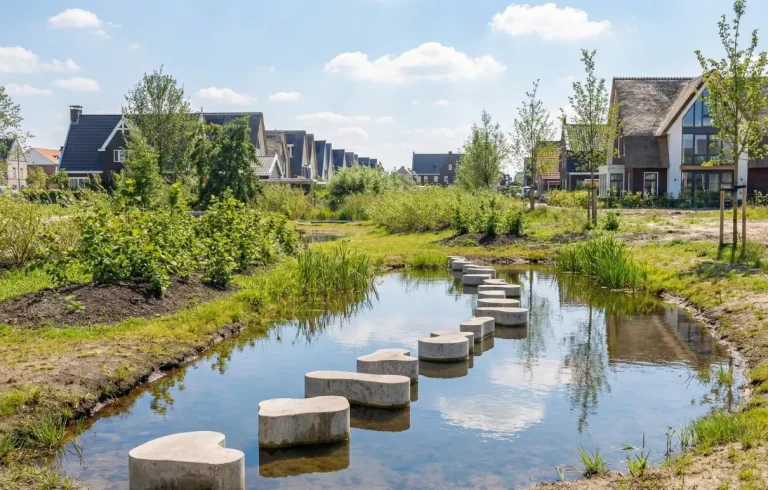- NL
- EN
Samenwerking SmartCity-IoT by Flexyz en Smart City System: parkeersensoren bevorderen de doorstroom
HARDERWIJK – IOT-bedrijf SmartCity-IoT by Flexyz uit Harderwijk werkt sinds kort samen met het Duitse Smart City System. Dit bedrijf ontwikkeld parkeeroplossingen die veel worden gebruikt door gemeenten om bij te houden waar nog parkeerplaatsen vrij zijn. Door die informatie door te geven aan automobilisten via matrixborden, een app of een website, voorkomen ze dat automobilisten onnodig lang rondrijden op zoek naar een parkeerplaats. Dat bevordert de doorstroming in steden en het beperkt onnodige uitstoot.
De CO2-besparing die gemeenten kunnen behalen door gebruik van sensoren is aanzienlijk. Volgens onderzoeken bestaat 30 procent van alle verkeer in binnensteden uit zogenaamd ‘zoekverkeer’. Sinds de oprichting van het bedrijf, in 2017, zijn al meer dan 50.000 sensoren geïnstalleerd in Duitsland en andere Europese landen. Beide partijen willen nu ook de Nederlandse markt veroveren met deze oplossing. Die past bij andere maatregelen die gemeenten nemen, zoals de invoering van milieuzones waarin onder meer vrachtauto’s en bussen die op diesel rijden worden geweerd.
SmartCity-IoT heeft veel kennis en ervaring in het gebruik van sensoren in de buitenruimte. Robin Schapink, SmartCity-IoT projectleider, zegt dat deze samenwerking is ingegeven door de behoefte aan robuuste sensoren met een langere accuduur. “De sensoren van Smart City System zijn hufterproof. Bovendien blijkt uit de eerste proeven dat ze hun data ook blijven doorgeven als er in de buurt sprake is van bijvoorbeeld magnetische verstoring. “Daarnaast reageren de sensoren snel wanneer er een auto wordt geparkeerd of weer wegrijdt, is de data uit de sensoren betrouwbaar en is het beheer en onderhoud van het systeem goed georganiseerd.”
Patrick Hanslbauer, Partner Manager van Smart City System zegt dat hij erg blij is met de samenwerking met SmartCity-IoT. ‘’De combinatie van kennis over Smart Cities en technische knowhow is voor ons perfect om de marktintroductie in Nederland met SmartCity-IoT te starten. We hopen dat we met onze oplossingen veel steden en burgers meerwaarde kunnen bieden.”
Van gastvrijheid tot parkeerregels handhaven
Parkeersensoren hebben nog meer voordelen voor gemeenten. Het verhoogt de gastvrijheid voor bijvoorbeeld toeristen of andere bezoekers van een stad of (evenementen) locatie, door ze tijdig te laten weten waar parkeerruimte is. Maar ook waar en hoeveel; laadpalen, invaliden- of gezinsvriendelijke parkeerplaatsen beschikbaar zijn. Daarnaast geven de sensoren volgens Schapink inzichten over gegevens als bezettingsgraad en parkeerduur. Datagedreven gemeenten kunnen die informatie gebruiken om hun parkeerbeleid te onderbouwen en betere beslissingen te nemen.
Ook helpt sensordata om parkeerregels te handhaven. De app kan een seintje geven als auto’s ergens langer geparkeerd staan dan toegestaan, of als ze plekken in beslag nemen die vrij moeten blijven voor gehandicapten of hulpdiensten. In dit geval kan de handhaving direct en gericht optreden. Een ander veelvoorkomend scenario in binnensteden is dat parkeerplaatsen tijdens weekendmarkten vrij moeten worden gemaakt als marktstandplaats. Het op afstand kunnen monitoren bespaart ook hier tijd en rijbewegingen.
Altijd beschikbaar, altijd beschermd
Door de samenwerking met Smart City System is SmartCity-IoT in staat om klanten nog betere kant-en-klare Internet of Things-oplossingen te bieden. Data wordt getoond op een overzichtelijk dashboard. Gebruikers hebben geen omkijken naar connectiviteit en veiligheid, data is altijd beschikbaar en goed beschermd. Zo kunnen gemeenten datagedreven werken, sneller en efficiënter zijn en duurzame doelen halen. Meer over de mogelijkheden van parkeersensoren kun je hier vinden.
SmartCity-IoT by Flexyz and Smart City System Collaboration: Parking sensors enhance traffic flow
HARDERWIJK – IoT company SmartCity-IoT by Flexyz from Harderwijk has recently started collaborating with the German startup Smart City System. This company manufactures parking sensors that are widely used by municipalities to track available parking spaces. By conveying this information to motorists through matrix signs, an app, or a website, they prevent people from wasting time and money in search of a parking spot. This promotes a smoother traffic flow in cities and limits unnecessary emissions.
The CO2 savings that municipalities can achieve through the use of sensors are significant. According to studies, 30 percent of all traffic in city centers consists of so-called ‘search traffic’. Since the company was founded in 2017, more than 50,000 sensors have been installed in Germany and other European countries. Both parties now also aim to conquer the Dutch market with this solution, which complements other measures taken by municipalities, such as the introduction of environmental zones where, among other things, diesel trucks and buses are banned.
SmartCity-IoT has extensive knowledge and experience in using sensors in outdoor spaces. Robin Schapink, SmartCity-IoT project leader, says that this collaboration is driven by the need for robust sensors with a longer battery life. “The sensors from Smart City System are tamper-proof. Moreover, initial trials show that they continue to transmit data even in the presence of, for example, magnetic disturbances. Additionally, the sensors respond quickly when a car parks or leaves, the data from the sensors is reliable, and the system’s management and maintenance are well-organized.”
Patrick Hanslbauer, Partner Manager from Smart City System, has expressed his satisfaction regarding the collaboration with Flexyz. “The combination of knowledge about Smart Cities and technical expertise is perfect for us to start the market introduction in the Netherlands with SmartCity-IoT. We are confident that our solutions can provide significant added value to many cities and citizens.”
From hospitality to enforcement of parking regulations
Parking sensors have even more advantages for municipalities. They increase hospitality for tourists or other visitors to a city or (event) location by sharing the real-time availability of individual parking spaces. Additionally, the parking sensors deliver live information on where and how many charging points, disabled or family-friendly parking spaces are available. According to Schapink, the sensors also provide insights into data such as occupancy rates and parking duration. Data-driven municipalities can use this information to substantiate their parking policies and empower cities to make informed decisions.
Sensor data also helps in enforcing parking regulations. The app can alert if cars are parked longer than allowed, or if they occupy spaces reserved for disabled people or emergency services. In this case, enforcement can act directly and specifically. Another common scenario in city centers is that parking spaces must be cleared during weekend markets for market stalls. Remote monitoring saves time and driving movements here as well.
Always available, always protected
Through the collaboration with Smart City System, SmartCity-IoT can now offer customers even better turnkey Internet of Things solutions. Data is displayed on an easy-to-use dashboard. Users don’t have to worry about connectivity and security; data is always available and well protected. Thus, municipalities can work in a data-driven manner to more efficiently achieve its sustainability goals. More about the possibilities of parking sensors can be found here.




